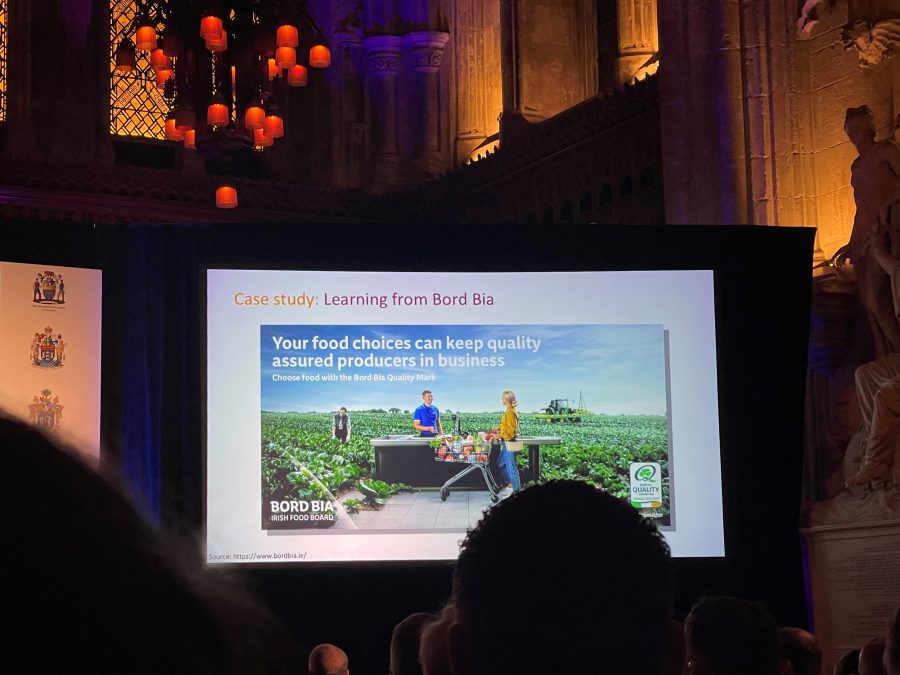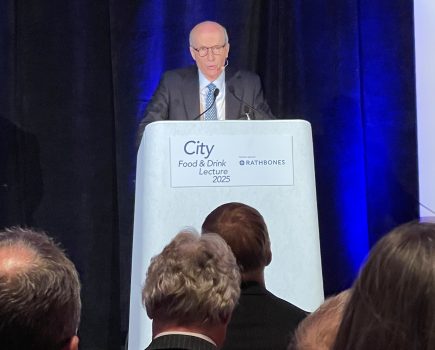The City Food and Drink Lecture this year saw a capacity audience with a healthy number of online attendees, too. The event continues to grow year on year, its importance as a meeting place of food and retail leaders and policy influencers having never been more evident.
Simon Roberts, the CEO of Sainsburys, gave the key note lecture, while the panel consisted of Dan Aherne of New England Seafood, Anna Taylor from the Food Foundation and Tom Bradshaw, the new NFU President, all of whom I feel could easily fill the lecture spot in the future.
Simon’s opening statement expressed his concerns with the British food system before he went on to highlight what he saw as a need to produce a food policy that supports the production of as much food as possible.
Sadly, this follows the loss of 25% of the British pig herd and comes at a time when UK farmers have enormous issues with being able to bring in labour, manage seasonal crops in a changing climate and deal with new environmental schemes and the impacts of a green policy that seems set on taking too much land out of production.
“We cannot have a reduction in our capacity to produce food. It’s not sustainable and importation is not the answer,” he said. “Paying farmers a sustainable price and delivering affordable healthy food is a priority.”
Simon went on to state that sustained action and the need to move at a greater pace to support British farmers had to be at the top of policy making of whichever government came next.
It is well known that any manifesto needs to embrace the food system and the need to support farmers; the big challenge coming from any crossover of departments causes issues in integration and stifles any joined up policy decision making.
In a short clip from Clive Black of Shore Capital we were told that short-term negotiation doesn’t work and that long-term partnerships with investment over time are needed if we are to improve availability of food based on a pricing structure that offers a viable, sustainable return to producers and ensures better long-term food security.
Simon highlighted Bord Bia as a case study for how collaboration across an industry is desirable in a competitive marketplace.
Tom Bradshaw gave an articulate response, especially on the government policy element, pointing out that it was all very well stating that food production was a priority but that the vision needed clarity, reality and policy.
He said policy was currently a barrier and called for trade policies that stopped members being undermined by imported products.
Anna Taylor opened with a claim that the country was a long way from a great food system and needed a policy framework and a minister of food who would deliver a primary legislation framework, to get back the 10 years of healthy life being lost to poor diets.
She said it was the role of the food industry to share in boosting the nation’s health, pointing out that the Office of Budget Responsibility had had to adjust the figures for those who were economically inactive due to health upwards to 2.25m people, 130,000 more than 12 months ago. Poor food, she said, damaged long term health.
Dan Aherne added that sustainability was as much about the people as about economic sustainability, while Tom Bradshaw observed that while retailers can import food made with cheaper systems and inputs, they will always have a reason to undermine home production.
There is no level playing field currently, despite the UK having a climate that is great for food production and a professional industry focussed on high quality food. Trade policy cannot continue to undermine production.







